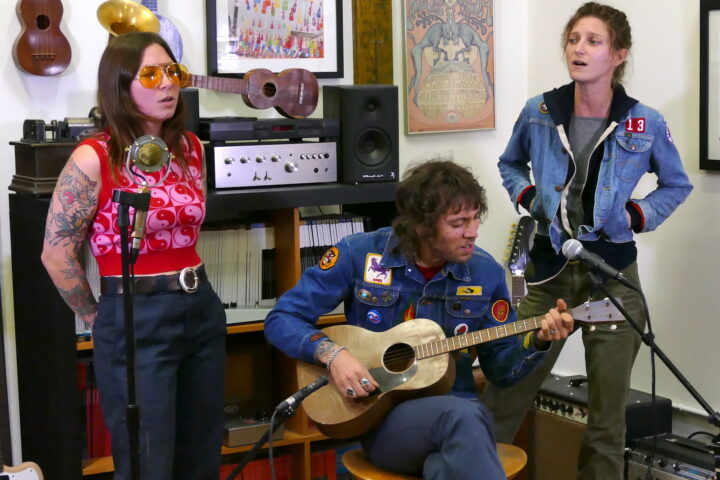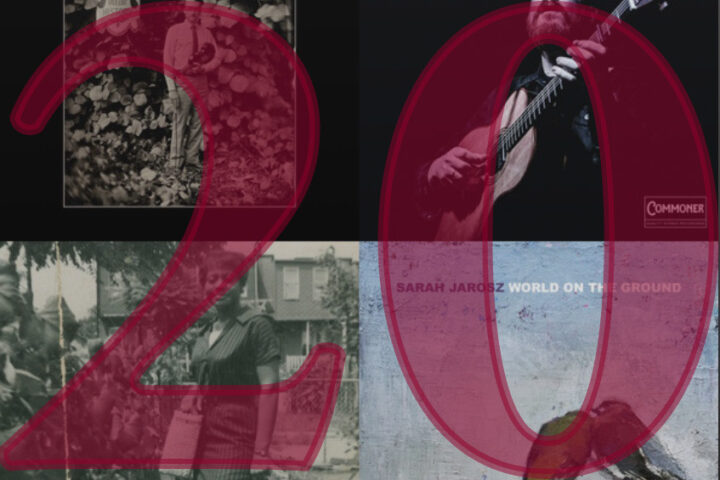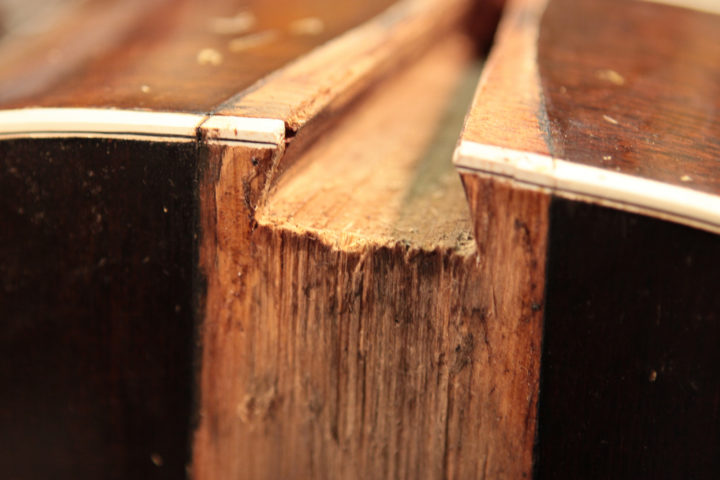The year is far from over but we can say with confidence that Amanda Shires’ To the Sunsethas a lock in our top 10 albums of 2018. Shires, a Nashville-based singer-songwriter/fiddler, has been on our radar for years (let’s not forget, her husband, Jason Isbell, just graced the Fretboard Journal #41, too), but this album is a different beast: The fiddle and guitar take a back to her otherworldly voice, ridiculously catchy rhythms and clever songwriting. In short, it’s the mark of a songwriter having fun in the studio.
Shires, in person, seems to be having fun as well. When she and her band stopped by the Fretboard Journal, all-Martin guitars in-tow, Shires talked to us about everything from puppets (a continuation of her podcast chat with our colleague James A. Willis) to tenor guitars, songwriting in closets and more.
Fretboard Journal: So, what’s the deal with Dave Cobb [the producer behind both To the Sunset and Jason Isbell’s The Nashville Sound]? I see his name everywhere now. Is he just the guy to hire?
Amanda Shires: He is the guy. I think what Dave Cobb has is a mind that understands artists. He has the ability to translate what I hear in my brain for a song… what I want it to sound like. I can describe it in my own words, but I lack the technical vocabulary and I don’t know what any of the knobs do. I’ll say something like, You know, it really needs to sound more axle-left… but if it was axle-left in a closet, like in a padded-room closet. He’ll bring out a couple of things that might have that sound and we’ll start experimenting. Or… I know the perfect way to make this song sound like it’s underwater. He has that ability to translate whatever it is that the artist’s vision is into what you hear, when you hear the records.
And it’s really cool because when you describe something that is as vague and abstract as music, [some producers] would probably think, “What in the hell are you talking about?” But he doesn’t. There’s no self-consciousness with him.
FJ: This record also sounds quite a bit different than the last couple. Was there any direction you gave him at the beginning or did it just evolve into this?
AS: Well, that last record I did [My Piece of Land] is very like close-to-me kind of record because I was pregnant at the time and dealing with all the hormones and emotions that go with that. But on the previous record, I think that you could hear some of the sounds starting to go in this direction. I do agree that [the new record] is more direct, instead of just a slow ease into it. It’s just like being pushed into a pool.
I did something with him that I’ve never done before which was have pre-production meeting. That’s a fancy word for me and him went to Chuy’s across from Studio A [in Nashville] and had some burritos. I talked to him about what I was hearing, that way he would know and sort of have ideas in the works to sleep on and stuff. I think that that was a result of just being locked in the closet for a month for twelve hours a day. I heard what I wanted it to sound like.
FJ: And this session took place after Jason’s The Nashville Soundhad been recorded, right? [Shires played fiddle and sang harmonies on the record.]
AS: Yes.
FJ:So had your time in those sessions influenced your production decision-making in any way?
AS: No, anytime I’m a side person, I’m always just trying to follow the artist’s goal… what they want in their songs. I don’t really think of it in terms of how it would ever apply to me, except for sometimes I hear guitar tones and I’m like, I really like that guitar tone. Can you do that? But more like Thom York. No… more like Mike Campbell. But then we do that with each other… Jason and I.
But whatever. Music is awesome.
FJ: Are there jams at the house between the two of you?
AS: There are. It turned in to jam of three recently, because we have a daughter and she’s three. We taught her how to play the trumpet and tuba. And she’s just tall enough where she can stand over the tuba and blow into it. She can’t really lift it up now, but it’s a really interesting jam.
FJ: A three-year-old can play a tuba?
AS: Yep.
FJ: I had no idea.
AS: I didn’t either, but this is my first time as a parent, so…
FJ: When did you take up fiddle?
AS: When I was ten. I saw one in a pawn shop when I was at my dad’s in the summer and I convinced him to buy it for me. We didn’t have a lot of money. I talked him into spending $65 on this fiddle and he was like, “Well, you have to learn it.” We got it back to his house and I broke all the strings and I didn’t know how to change strings. After the summer was over, my dad dropped me off at my mom’s and she got me lessons.
Ever since, it’s been the way I express myself. At that age, I didn’t have vocabulary to describe my feeling and I found expression in music. Now, I just hold on tight.
FJ: But at fifteen you were playing with the Texas Playboys, right?
AS: Yup. I would go and learn fiddle songs on a guy named Frankie McWhorter’s porch. He was in the Texas Playboys and I would learn from a guy named Tommy Allsup. He didn’t play the fiddle, but he was a fantastic guitar player. He played with Buddy Holly. He was my first employer and I think I learned a lot about how to play in a band and group dynamics and expectations [from him].
FJ: At fifteen, were you going on the road with these guys?
AS: Yeah, at this point they were in their seventies and eighties. Tommy passed away last year, but it was really a lot like having seven granddads. And at the end of dinner, suddenly seven jellos would appear. It was amazing. I loved it.
FJ: So how does the fiddle play into your songwriting now? Are you using it or are you going to ukulele or guitar or something else?
AS: I did a lot of this last record on autoharp. This gem of a guy named Paul Kennerley who produced White Mansions and stuff. I met him through Dave Cobb and I was talking to him about autoharps. I don’t know how that came up, but then he gave me one. When it came time to write the record, I’d tried writing in my house and it wasn’t working because the house is like the toddler’s house now.
But when I moved into the closet to write, it was small. I could fit it in there and then there was just some magic in it. But, to answer your question, yes I do use the violin to write because it’s melodic. It’s a melodic instrument and I know how to work melodies with it. So I might start something on the violin or the autoharp or the ukulele or the guitar or whatever, but there’s always some part of it where I have to go try to find or fix the melody. Especially when I get tired of caterwauling in the house. It’s like ow, ow, ow. That’s never gonna work. Gotta get the fiddle out, violin, whatever…
FJ: Just how small is this closet where you do all of your songwriting?
AS: Well, it’s not one of these California Kardashian closets, that’s for sure. I like to describe it as like an “Americana closet.” Which is really a strange this to say, but I think it paints a picture of laundry and boots everywhere. It’s like two closets stuck together and then a door.
I started taping all my words up because I didn’t have floor space. And then it started migrating outside of the closet into the bedroom…
FJ: And then you have the makings of a record?
AS: And then I have a record. I also learned how to accept my process.
FJ:You just played tenor guitar here at the FJ. How many tenor guitars do you have now?
AS: Four or five. One is not technically a tenor guitar, but a really great luthier named Joe Glaser in Nashville helped me turn a little death metal guitar into one.
FJ: Nice. What did it start out as?
AS: Something weird and cheap from Guitar Center, but we spray-painted it and hacked away at it with saws. It was really a good thing to have on the road because you couldn’t break it. I was touring around and having to check the thing [on planes] and I needed something that wasn’t priceless or precious.
FJ: And the metal guitar pickups sounded okay for your music? Or did you change them?
AS: Yeah, I just left ’em. Do that and an amp.
FJ: Earlier, you were saying something else interesting. Most fiddle and mandolin players tune their tenor guitars to CGDA, in fifths…
AS: Or GDAE.
FJ: But you play it DGBE, like the four strings on a six-string guitar?
AS: I go both ways. I get in my head a little bit about it because, because it’s sometimes weird to be up on a stage and you overthink. One day, I started thinking, I bet the whole audience thinks that I’m not even playing the song right because none of my fingers are matching everybody else’s.And then I also had this thought of,What if the band looks at me and their following my chord shapes. Is this all gonna go to hell?You know, just too in my head about it. I feel like I’ll probably go back to fifths tuning soon now that I… D.G.A.F.
FJ: Wait, what tuning is that ?
AS: That means… I don’t give a f*ck.


